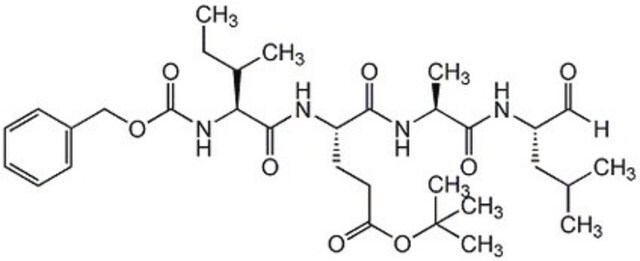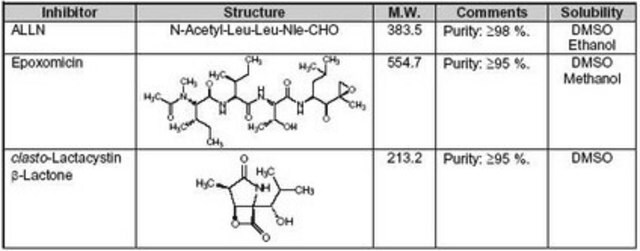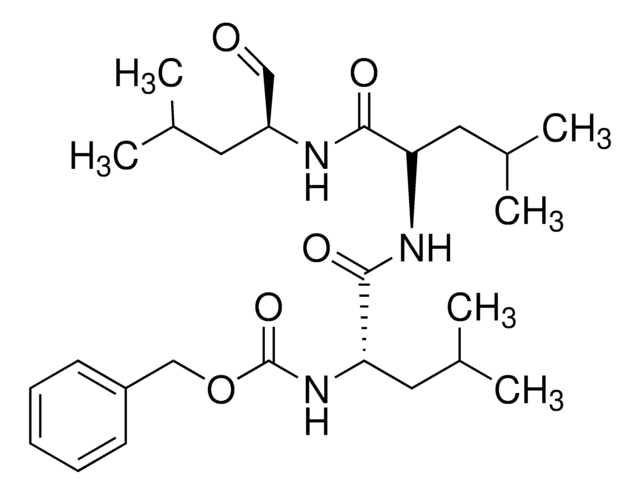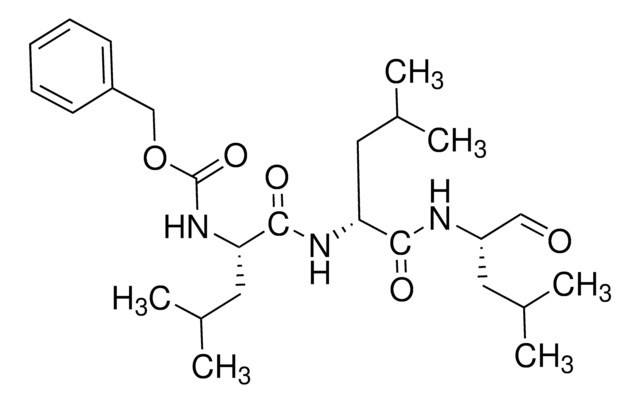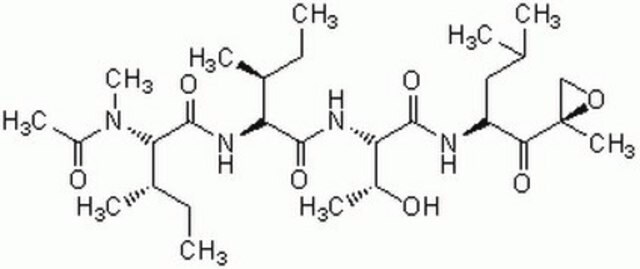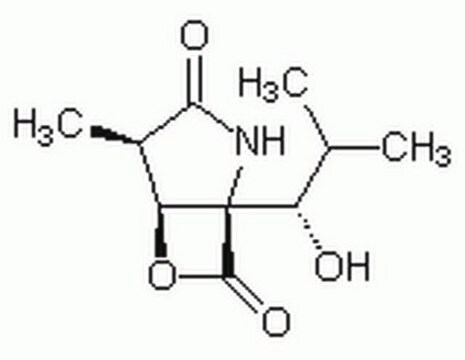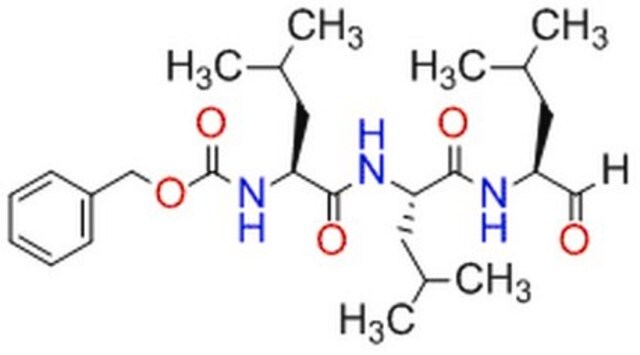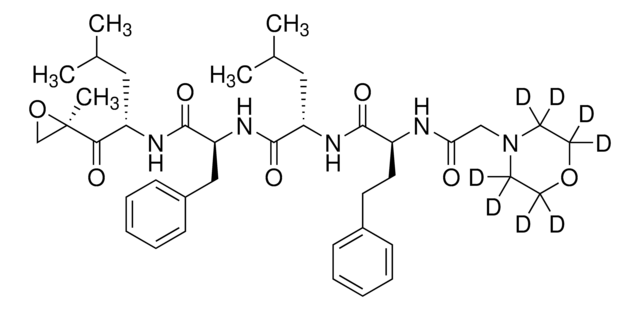539164
Proteasome Inhibitor Set I
The Proteasome Inhibitor Set I controls the biological activity of Proteasome. This small molecule/inhibitor is primarily used for Protease Inhibitors applications.
Zaloguj sięWyświetlanie cen organizacyjnych i kontraktowych
About This Item
Kod UNSPSC:
12352200
NACRES:
NA.77
Polecane produkty
Poziom jakości
Formularz
solid
producent / nazwa handlowa
Calbiochem®
warunki przechowywania
OK to freeze
Warunki transportu
ambient
temp. przechowywania
−20°C
Opis ogólny
Proteasomes are large multi-subunit protease complexes, localized in the nucleus and cytosol, which selectively degrade intracellular proteins. They play a major role in the degradation of many proteins involved in cell cycling, proliferation, and apoptosis. A vast majority of short-lived proteins are degraded by the ubiquitin-proteasome pathway. A protein marked for degradation is covalently attached to multiple molecules of ubiquitin (Ubq), a highly conserved 76-amino acid (8.6 kDa) protein, which escorts it for rapid hydrolysis to the multi-component enzymatic complex known as the 26S proteasome. The proteolytic core of this complex, the 20S proteasome, contains multiple peptidase activities and functions as the catalytic machine.
The ubiquitin-proteasome pathway plays a major role in the breakdown of abnormal proteins that result from oxidative stress and mutations that might otherwise disrupt normal cellular homeostasis. The reactive oxygen species can promote partial unfolding of the proteins, exposing its hydrophobic domains to proteolytic enzymes of the 20S complex. Rapid degradation of defective enzymes, as seen in diseases caused by metabolic abnormalities, also occurs in the proteasome. The Ubq-proteasome pathway has also been implicated in several forms of malignancy, in the pathogenesis of several genetic diseases, and in the pathology of muscle wasting. It is also involved in the destruction of proteins that participate in cell cycle progression, transcription control, signal transduction, and metabolic regulation.
The ubiquitin-proteasome pathway plays a major role in the breakdown of abnormal proteins that result from oxidative stress and mutations that might otherwise disrupt normal cellular homeostasis. The reactive oxygen species can promote partial unfolding of the proteins, exposing its hydrophobic domains to proteolytic enzymes of the 20S complex. Rapid degradation of defective enzymes, as seen in diseases caused by metabolic abnormalities, also occurs in the proteasome. The Ubq-proteasome pathway has also been implicated in several forms of malignancy, in the pathogenesis of several genetic diseases, and in the pathology of muscle wasting. It is also involved in the destruction of proteins that participate in cell cycle progression, transcription control, signal transduction, and metabolic regulation.
Działania biochem./fizjol.
Primary Target
MPC
MPC
Secondary Target
NF-κB activity
NF-κB activity
Ostrzeżenie
Toxicity: Standard Handling (A)
Inne uwagi
Grimm, L.M., et al. 1996. EMBO J.15, 3835.
Griscavage, J.M., et al. 1996. Proc. Natl. Acad. Sci. USA93, 3308.
Lee, D.H., and Goldberg, A.L. 1996. J. Biol. Chem.271, 27280.
Oda, K., et al. 1996. Biochem. Biophys. Res. Commun.219, 800.
Fenteany, G., et al. 1995. Science268, 726.
Traenckner, E.B., et al. 1994. EMBO J.13, 5433.
Griscavage, J.M., et al. 1996. Proc. Natl. Acad. Sci. USA93, 3308.
Lee, D.H., and Goldberg, A.L. 1996. J. Biol. Chem.271, 27280.
Oda, K., et al. 1996. Biochem. Biophys. Res. Commun.219, 800.
Fenteany, G., et al. 1995. Science268, 726.
Traenckner, E.B., et al. 1994. EMBO J.13, 5433.
Informacje prawne
CALBIOCHEM is a registered trademark of Merck KGaA, Darmstadt, Germany
Ta strona może zawierać tekst przetłumaczony maszynowo.
Kod klasy składowania
11 - Combustible Solids
Certyfikaty analizy (CoA)
Poszukaj Certyfikaty analizy (CoA), wpisując numer partii/serii produktów. Numery serii i partii można znaleźć na etykiecie produktu po słowach „seria” lub „partia”.
Masz już ten produkt?
Dokumenty związane z niedawno zakupionymi produktami zostały zamieszczone w Bibliotece dokumentów.
Klienci oglądali również te produkty
Powiązane treści
Wybierz różne typy inhibitorów proteaz w zależności od potrzeb, aby zapobiec degradacji białek podczas izolacji i charakteryzacji oraz zabezpieczyć białka podczas przygotowywania próbek.
Nasz zespół naukowców ma doświadczenie we wszystkich obszarach badań, w tym w naukach przyrodniczych, materiałoznawstwie, syntezie chemicznej, chromatografii, analityce i wielu innych dziedzinach.
Skontaktuj się z zespołem ds. pomocy technicznej